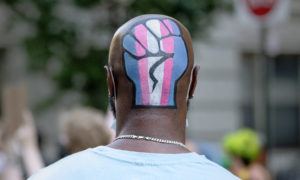Ever felt your ears burning? I get as much flak online as the next believer in the existence of human biology, but recently I’ve noticed it ramping up somewhat. For the purposes of researching this column, I gingerly dipped my toe into the search function on Twitter, and can report that in the last few weeks, I’ve been described as a “brain tumour” that “grew arms and legs”, a “creepy bigoted weirdo”, someone who “gets their rocks off to torturing people”, and “a cis woman cosplaying being a lesbian and a man”. Meanwhile, a trans celeb with whom I once debated civilly on Radio 4 announced to 67K followers that I’m a “mess” who should “just transition and get it over with”.
With fans like these, you might assume I would be supportive of the case currently being made by the BBC’s Disinformation and Social Media Correspondent for stricter regulation of disinformation and hate speech. In an interview and an accompanying feature published this week, Marianna Spring reiterates a narrative about Elon Musk’s takeover of Twitter that she first aired on Panorama a few weeks back. According to Spring, online disinformation and hate speech is getting worse, and it’s the responsibility of social media platforms to regulate it more heavily.
Like me, Spring receives a lot of online misrepresentation and criticism in her professional role. Indeed, she frequently uses such experiences as a superficially compelling peg for many of her stories. Despite our similarities, though, I remain unconvinced by her case for strong regulation. More than that: through observing her output, I’ve become convinced that the BBC should not have a specialist “Disinformation Correspondent” at all.
In this week’s interview, Spring described her job for the BBC as “interrogating how mistruths or trolling or abuse online can affect real people, and then to investigate and hold to account the social media companies, policy makers, law enforcement…”. At face value, this may seem like a fairly standard quest for a journalist, albeit a noble one — a bit like investigating fraudsters or corrupt politicians, in order to bring their misdeeds and lies into the light.
But there’s at least one big difference. A journalist investigating fraud, but who accidentally misidentifies either what fraud is or the people committing it, doesn’t thereby become guilty of the very thing she is investigating. In contrast, a Disinformation Correspondent who misidentifies disinformation, either positively or negatively, runs the risk of disseminating disinformation herself — and is arguably all the more harmful because of the status implied by her position.
Perhaps it could be rejoindered that disinformation is not the same as misinformation. Whereas misinformation consists in the unwitting dissemination of false statements believed to be true at the time, disinformation is the knowing introduction of false statements with the explicit intention to deceive people. In other words, with disinformation, there is an intent to deceive. That’s a reasonable distinction to make as far as it goes; the problem is that it’s utterly useless in helping us analyse the growing problem with conspiratorial and magical thinking in the world. It also has no relevance to most of the things reported on by Spring.
The capacity of human beings to cling to incredible beliefs in a self-serving way, while being blind to blatantly contrary evidence, is well-established. And given this capacity, it’s very hard to know whether conspiratorial thinking has been propagated in the cynical knowledge of its falsehood. For instance, those in charge of Russian botfarms churning out what liberals call “pro-Putin propaganda” probably half-believe their own falsehoods. The originator of the New World Order conspiracy theory almost certainly believed his. Even bonkers theories like the lizard people one were probably started by the mad rather than the bad. Ironically, the persistent belief that there is a lot of disinformation in the world, in the sense of deliberately deceptive lies, is itself a kind of conspiracy theory. For some people, it seems much easier to believe in the organised and deliberate deception of others than in the chaos of accidental human fallibility.
In practice, then, any conception of disinformation as positively requiring intentional deception is going to be of marginal use to society at most. And it certainly seems unlikely that the BBC would ever have put someone in a full-time role to investigate disinformation, had this been the background idea. It’s far too niche.
In fact, what Spring tends to investigate at least some of the time is disinformation in a broader and potentially more useful sense, meaning something like: widespread false or misleading beliefs, seemingly attractive to people for reasons that have little to do with the amount of good evidence available for them, and which cause significant social dysfunction. Whatever the reason for these beliefs, a neutral approach to evidence has taken a back seat to some other goal, and the process of producing them is no longer what epistemologists call “truth-tracking”. In this broader sense, spreading or believing disinformation is not just about misinterpreting evidence, but rather about ignoring certain inconvenient bits of evidence to fit with prior political, social, or emotional goals.
This is perhaps a more useful conception of disinformation, though admittedly not as snappy. The problem for Spring now is that it seems to apply to some of her own output too. This is understandable, given that, to paraphrase the King James Bible, it’s always easier to notice the motes in other people’s eyes rather than the beams in your own. Nearly everyone is subject to bias, like I said. But given Spring’s job title and growing influence, including a recent expert appearance at a Parliamentary Committee about online speech regulation, I still think it’s a problem.
Take the Panorama documentary. The narrative offered by Spring and the team around her was almost parodically absent of nuance, offering no attempted counterpoint to the extremely simple and obviously partisan fairy-tale it was thrusting upon the viewer. This story goes: a bad and foolish man took over Twitter (Spring barely suppresses her eyerolling as she talks about him); he laid off a lot of people responsible for dealing with “hate speech”; hate speech increased exponentially; regulators therefore need to do more to protect the ordinary people that suffer.
Basic critical questions one might have asked about this narrative were missing in action. The most obvious of these is what counts as hate speech. Throughout her work, Spring’s habitual examples (speech by misogynists, rape apologists, anti-vaxxers, climate change deniers) tend to suggest she thinks hate speech is angry, threatening, and/or insulting speech produced by people with the Wrong Politics, causing anxiety and distress in more innocent people who don’t share their persecutors’ dodgy views. I’d be fascinated to know whether Spring assumes that the level of insult and aggression flung by online anti-vaxxers towards epidemiologists, for instance, becomes morally neutralised when directed instead towards radical feminists, Zionists, Tory politicians, or any other folk devils of the contemporary progressive mindset.
A second obvious question unexplored by Spring’s documentary is what negative consequences might follow when you devolve responsibility for what counts as hate speech to people working in Silicon Valley. For instance, gender-critical and radical feminists have been at the sharp end of regulatory decisions by Twitter for years now — many of them banned or censored for talking about the social importance of biological sex, or for saying it cannot be changed.
The crossover between tech bros and people of a transactivist or transhumanist persuasion is high. But in her work, Spring seems uncurious about any potential for political bias or self-interest in their decision-making — quite possibly because, like many others, her compass for what counts as hate speech has been significantly affected by exposure to the values of people working in Silicon Valley. Again, this is hardly a crime. Nobody forms their beliefs in a social vacuum. But as a Disinformation Correspondent, it might be good to have self-awareness about it.
When it comes to examples of disinformation, meanwhile, Spring has a tendency to roll relatively reasonable cases of political wrongthink together with madly conspiratorial ravings, suggesting that she doesn’t really differentiate between them. If you start off as an anti-vaxxer or lockdown sceptic, she seems to imply, you might easily end up a climate-change denier, or even a believer in a New World order. When talking about QAnon supporters, she clearly feels it’s important to throw in that they are “pro-Trump” as well — as if being a member of QAnon wasn’t quite bad enough. Such clues to what Spring really thinks of them must be quite infuriating to the thousands of anti-vaxxers and Trump supporters who hold those positions for relatively non-conspiratorial reasons. And then there’s Spring’s tendency to turn stories about conspiracy theorists into suspiciously neat cautionary tales propping up preferred social values — such as in her documentary series about a conspiracy theorist called Gary, who didn’t believe in Covid until it killed him, quite conveniently for the triumphalist narrative purposes of many at the time. It’s almost enough to make you believe in the existence of a repressive liberal media elite.
So what should journalism do with the growing phenomenon of disinformation, if not this? In the old days, of course, we used to have lots of disinformation specialists. We called them investigative journalists. They covered stories in some depth, gave voice to a range of counterpoints, and tried to ensure that their personal views weren’t in the driving seat, even if they sometimes failed in the attempt. By their general example, they encouraged readers and viewers to trust them, or at least, not to virulently distrust them — not because they had the “right” political values, but because they had the right journalistic ones.
These days, though, slowburn investigative journalism is often too expensive, and doesn’t get the same clicks as a hot take. So instead, the idea of disinformation gets thematised as if it were a special kind of moral vice only committed by ill-intentioned or delusional others, to be rooted out and exposed by the intrepid journalist-activist on the side of the good. But good and evil are not so straightforward. In the long run, I suspect this vaccine may turn out to cause more epistemic illness than it prevents.
Disclaimer
Some of the posts we share are controversial and we do not necessarily agree with them in the whole extend. Sometimes we agree with the content or part of it but we do not agree with the narration or language. Nevertheless we find them somehow interesting, valuable and/or informative or we share them, because we strongly believe in freedom of speech, free press and journalism. We strongly encourage you to have a critical approach to all the content, do your own research and analysis to build your own opinion.
We would be glad to have your feedback.
Source: UnHerd Read the original article here: https://unherd.com/



